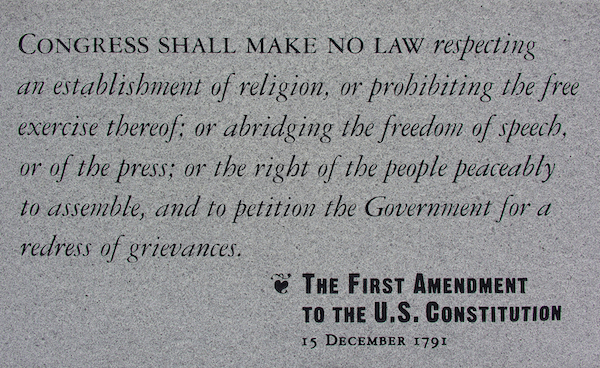Photo of the stone plaque in Independence National Historical Park by Ed Uthman, Flickr
The First Amendment of the US Constitution gives us five crucially important freedoms: freedom of religion, of speech, of the press, of assembly, and of petition. While these freedoms are interpreted in different ways by different people throughout our history, one thing that is not debatable is how important these freedoms are for our democracy. I’ve written separately about how important press freedom and religious freedom are to our country. In this blog post, I focus in particular on the three freedoms of speech, assembly, and petition—the foundations for independent citizen activism.
As Craig from PBS’s Crash Course Government and Politics says, “There are two really important things to remember about the First Amendment protection of free speech. The primary reason we have freedom of speech is to allow for public criticism of the stupid government. Stupid government. That’s the sort of thing that can land you in jail in countries that don’t have strong free speech protections, or should I say, you would be Putin jail, heh, don’t put me in jail. Oh, that’s right, I’m in the US, it doesn’t matter.”
The First Amendment protections of speech, assembly, and petition allow people to express their opinions to each other and to their government officials in an effort to improve situations and rectify wrongs. This ability to speak critically to one another and to the government is the bedrock of a democracy, according to many liberal and maximalist democratic theorists. In his book On Democracy, Robert A. Dahl (described by Yale University Press as the “preeminent democratic theorist of our time”) argues that a true democracy must provide the ability for its participants to achieve enlightened understanding in order for their votes and other participatory actions to actually be informed. This enlightened understanding can only occur through freedoms of press, speech, assembly, and petition, where people share their views openly, critically, and civilly with one another.
It was so refreshing to be approached by a citizen activist at the Natick Farmers Market with a pamphlet and petition about the Charles River Dam! She made the case for repairing rather than removing the dam and encouraged us to sign her group’s petition. There are always two (or more) sides to an issue, and pros and cons to each solution. But it is wonderful to be back in a democracy where people are allowed to pass out flyers, hold rallies, set up a booth, create awareness, and get signatures on a petition! Face-to-face conversations, civil persuasion, and dialogue between sides are the lifeblood of democracy. Enjoy the interactions and appreciate your freedoms!
